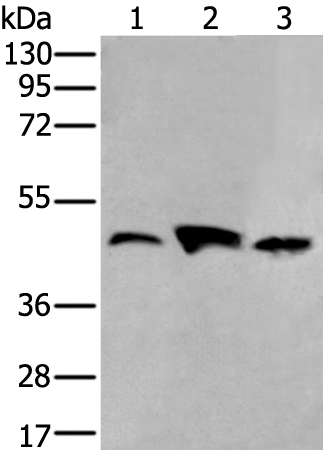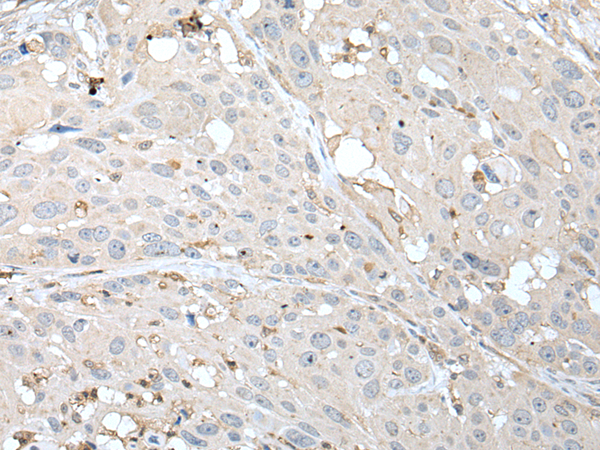

| WB | 咨询技术 | Human,Mouse,Rat |
| IF | 咨询技术 | Human,Mouse,Rat |
| IHC | 1/25-1/100 | Human,Mouse,Rat |
| ICC | 技术咨询 | Human,Mouse,Rat |
| FCM | 咨询技术 | Human,Mouse,Rat |
| Elisa | 1/5000-1/10000 | Human,Mouse,Rat |
| WB Predicted band size | 40 kDa |
| Host/Isotype | Rabbit IgG |
| Antibody Type | Primary antibody |
| Storage | Store at 4°C short term. Aliquot and store at -20°C long term. Avoid freeze/thaw cycles. |
| Species Reactivity | Human, Mouse |
| Immunogen | Fusion protein of human VASP |
| Formulation | Purified antibody in PBS with 0.05% sodium azide and 50% glycerol. |
+ +
以下是关于VASP抗体的3-4篇参考文献的简要概括:
1. **"Assessment of ADP-Induced Platelet Aggregation with VASP Phosphorylation in Patients on Clopidogrel Therapy"**
- **作者**: Schwarz et al. (2003)
- **摘要**: 该研究利用抗磷酸化VASP抗体,通过流式细胞术检测血小板中VASP的Ser239磷酸化水平,评估P2Y12受体拮抗剂(如氯吡格雷)的抗血小板治疗效果,提出VASP磷酸化可作为个体化抗凝治疗的生物标志物。
2. **"Antagonism Between Ena/VASP Proteins and Actin Filament Capping Regulates Fibroblast Motility"**
- **作者**: Bear et al. (2002)
- **摘要**: 研究通过VASP特异性抗体进行免疫荧光定位,发现Ena/VASP蛋白通过拮抗肌动蛋白纤维“加帽”调控细胞骨架动态,从而影响成纤维细胞迁移,揭示了VASP在细胞运动中的关键作用。
3. **"VASP-Dependent Actin Polymerization in the Immunological Synapse of Cytotoxic T Lymphocytes"**
- **作者**: Krause et al. (2000)
- **摘要**: 使用VASP抗体阻断实验,证明VASP介导的肌动蛋白聚合对T细胞免疫突触的形成至关重要,影响细胞毒性颗粒的定向分泌及T细胞活化。
4. **"Development of a Phospho-Specific VASP Antibody for Monitoring cAMP/PKA Signaling in Cardiovascular Cells"**
- **作者**: Haffner et al. (2005)
- **摘要**: 描述了针对VASP Ser157磷酸化位点的抗体开发,验证其在心血管细胞中检测cAMP/PKA信号通路的特异性,为研究血管舒张机制提供了可靠工具。
这些文献涵盖了VASP抗体在疾病治疗评估、细胞迁移机制、免疫调控及方法学开发中的应用。
VASP (Vasodilator-Stimulated Phosphoprotein) antibodies are essential tools for studying the role of VASP, a key actin-binding protein involved in regulating cytoskeletal dynamics and cell motility. VASP is enriched in focal adhesions, cell-cell junctions, and lamellipodial tips, where it modulates actin polymerization by interacting with Ena/VASP family proteins. Its function is tightly regulated by phosphorylation, particularly via cAMP- and cGMP-dependent kinases (PKA/PKG), which influence its localization and activity in processes like cell migration, adhesion, and platelet aggregation. Dysregulation of VASP is linked to pathologies such as cancer metastasis, cardiovascular diseases, and immune disorders.
VASP antibodies are widely used in techniques like Western blotting, immunofluorescence, and immunohistochemistry to detect expression levels, phosphorylation status (e.g., Ser157. Ser239), and subcellular distribution in various tissues or cell models. Researchers employ these antibodies to explore VASP's role in signaling pathways (e.g., Rho GTPases, integrin signaling) or its interaction with partners like zyxin or profilin. Commercial VASP antibodies are typically raised against recombinant protein fragments or synthetic peptides, with validation in knockout controls to ensure specificity. Their applications span basic research in cell biology and translational studies targeting cytoskeleton-related diseases.
×